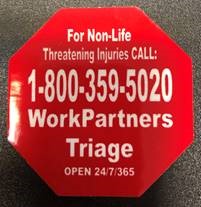If a fire alarm goes off at work you typically know what actions to take. On a building site, if someone falls and is hurt, there are procedures to follow to get help and support the individual. But what if you notice a coworker struggling with their mental health? How exactly do you help them? There’s no easy one-step solution, but there’s still a lot you can do to aid your friend in need. Depression and anxiety are the two most common mental health struggles people encounter. They can show up in different ways depending on the person and situation. The first step in helping anyone is realizing they need assistance.
HERE ARE SOME SIGNS YOU MAY NOTICE:
DEPRESSION • Loss of interest in activities • Decreased motivation • Feeling down and not knowing why • Irritability, easily angered • Loss of appetite • Sleeping too much or too little • Feeling worthless • Withdrawing from others • Fatigue, decreased energy • Thinking of suicide
ANXIETY • Feeling nervous, tense, or restless • Worrying much of the time • Having a sense of panic • Long-term or severe fatigue • Trouble concentrating • Trouble sleeping • Increased heart rate, hyperventilating • Trembling, sweating • Physical problems: headaches, GI
HOW TO RESPOND:
When people are struggling or experiencing a crisis, people may act in ways that are unusual for them. These changes in a person’s behaviors and/or mood can be a big sign that something is wrong.
1. Listen without making judgements and focus on their needs in that moment
2. Ask them what would help them
3. Continue to listen first throughout
4. Do not minimize what they say or how they feel; their pain is front and center
5. Avoid confrontation
6. Ask if there is someone they would like you to contact
7. Offer practical information like what resources are available.
WHAT GETS IN THE WAY OF REACHING OUT FOR HELP:
A Culture of Toughness: We can have a culture of self-reliance and feel valued for our toughness, both physically and mentally.
Negative Coping Strategies: Turning to alcohol and drugs can lead to a false sense that “workers are dealing with it ok”.
Stigma: Industry stigma makes it hard to put your hand up and say, “I’ve got a problem.”
WHAT NOT TO SAY “It’s not that bad, you’ll see.” “Things could be worse!” “You have a great life and seem so happy!” “Can’t you just snap out of it?” “Look on the bright side.”
We often have good intentions of cheering up co-worker and friends. But when people are struggling, they may feel misunderstood or that you’re not taking them seriously. For example, a person may feel like they don’t have a right to feel bad, or that there is something wrong with their experience.
Ways you can help:
- Assist with EAP information for their company.
- Locate a Mental Health emergency hot line. Such as 988 hotline.
- https://988lifeline.org/
- Assist them with contact information for a local hospital.
- Often times just listening and being present and aware may be all someone needs to feel better.

